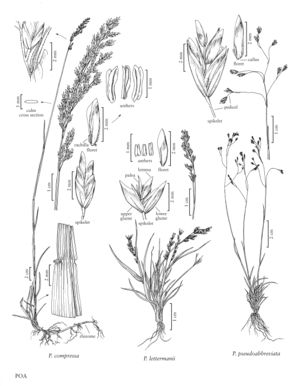Difference between revisions of "Poa pseudoabbreviata"
FNA>Volume Importer |
FNA>Volume Importer |
||
| Line 20: | Line 20: | ||
-->{{Treatment/Body | -->{{Treatment/Body | ||
|distribution=Alaska;B.C.;N.W.T.;Yukon | |distribution=Alaska;B.C.;N.W.T.;Yukon | ||
| − | |discussion=<p>Poa pseudoabbreviata is a low arctic to subarctic and alpine species of Alaska, northwestern Canada, Siberia, and the Russian Far East. It grows mainly on frost scars, rocky slopes, and ridges, often on open ground. It is one of only three diploid species native to the Western Hemisphere.</p><!-- | + | |discussion=<p><i>Poa pseudoabbreviata</i> is a low arctic to subarctic and alpine species of Alaska, northwestern Canada, Siberia, and the Russian Far East. It grows mainly on frost scars, rocky slopes, and ridges, often on open ground. It is one of only three diploid species native to the Western Hemisphere.</p><!-- |
| − | --><p>Poa pseudoabbreviata is easily distinguished from all other alpine and arctic species of Poa by its spreading, capillary branches, long pedicels, short stature, small spikelets, and glabrous calluses. Bulbiferous plants are known only from the Brooks Range, Alaska.</p> | + | --><p><i>Poa pseudoabbreviata</i> is easily distinguished from all other alpine and arctic species of <i>Poa</i> by its spreading, capillary branches, long pedicels, short stature, small spikelets, and glabrous calluses. Bulbiferous plants are known only from the Brooks Range, Alaska.</p> |
|tables= | |tables= | ||
|references= | |references= | ||
| Line 42: | Line 42: | ||
|publication year= | |publication year= | ||
|special status= | |special status= | ||
| − | |source xml=https://jpend@bitbucket.org/aafc-mbb/fna-data-curation.git/src/ | + | |source xml=https://jpend@bitbucket.org/aafc-mbb/fna-data-curation.git/src/8f726806613d60c220dc4493de13607dd3150896/coarse_grained_fna_xml/V24/V24_814.xml |
|subfamily=Poaceae subfam. Pooideae | |subfamily=Poaceae subfam. Pooideae | ||
|tribe=Poaceae tribe Poeae | |tribe=Poaceae tribe Poeae | ||
Revision as of 17:22, 18 September 2019
Plants perennial; glaucous; densely tufted, delicate, not stoloniferous, not rhizomatous. Basal branching all or mainly intravaginal. Culms 4-20(30) cm, to 18 cm in bulbiferous plants, slender. Sheaths closed for 1/10 – 1/6 their length, terete; ligules 1-4 mm, smooth; blades 0.5-1.5(2) mm wide, flat or folded, thin, soft, apices narrowly prow-shaped. Panicles 2-7 cm, 2-4 cm in bulbiferous plants, widths equal to lengths, erect, broadly rhomboidal to pyramidal, open, exserted from the sheaths, sparse; branches 1.5-5 cm, ascending to spreading, divaricate, slender, sulcate or angled, angles sparsely to moderately scabrous; pedicels often longer than the spikelets. Spikelets 3-5 mm, laterally compressed, rarely bulbiferous, usually strongly anthocyanic, glaucous or not; florets 2-4, rarely bulb-forming; rachilla internodes shorter than 1 mm, smooth to scabrous. Glumes distinctly keeled; lower glumes subequal to equaling the lowest lemmas, 3-veined, upper glumes frequently longer than the lowest lemmas; calluses glabrous; lemmas 2-3 mm, lanceolate, distinctly keeled, thin, keels and marginal veins crisply puberulent, rarely glabrous, intercostal regions glabrous, apices acute; paleas scabrous over the keels; anthers 0.2-0.7 mm. 2n = 14.
Distribution
Alaska, B.C., N.W.T., Yukon
Discussion
Poa pseudoabbreviata is a low arctic to subarctic and alpine species of Alaska, northwestern Canada, Siberia, and the Russian Far East. It grows mainly on frost scars, rocky slopes, and ridges, often on open ground. It is one of only three diploid species native to the Western Hemisphere.
Poa pseudoabbreviata is easily distinguished from all other alpine and arctic species of Poa by its spreading, capillary branches, long pedicels, short stature, small spikelets, and glabrous calluses. Bulbiferous plants are known only from the Brooks Range, Alaska.
Selected References
None.
